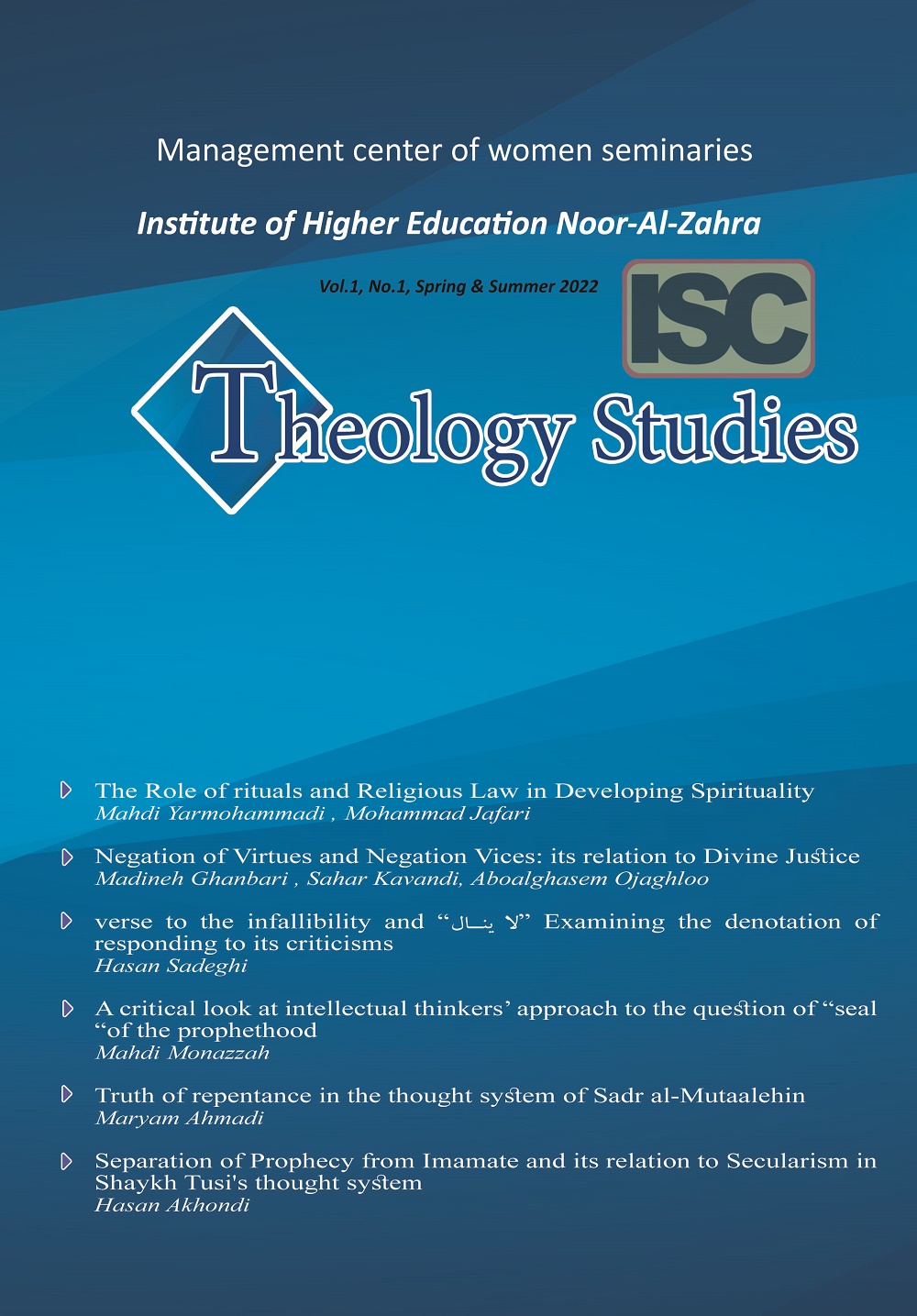Examining the denotation of “لا ینال” verse to the infallibility and responding to its criticisms
Document Type : Original Article
Author
سطح چهار فقه و اصول حوزه علمیه قم
Abstract
Among the verses denoting the chastity of prophets and Imams, is the 124th verse of Al-Baqara. Its most important clause states that “My covenant is not extended to the wrongdoers”. From Shi’ah’s perspective, this verse refers to the Imams’ being innocent of any flaw and guilt. Therefore, if someone commits a sin and then repents, he is no more entitled to prophecy and Imamate. However, Sunnis believe that absolute chastity is not required for prophecy and Imamate and in case of repentance from sin, one becomes eligible for prophecy and Imamate. The present article with an analytical-critical approach, substantiates the Shi’ah’s perspective regarding the absolute chastity of prophets and Imams mentioned in “لا ینال” verse and responds to some of the criticisms of respected authors. Like Shi’i scholars, the writer believes that in “لا ینال” verse, the word “wrong-doer” is “the time of possession (ĥāl al-talabbus)”, which is viewed as an absolute truth by all Uşūlīs and accordingly denotes absolute chastity. The claim that “wrong-doer” refers to someone who possesses the quality of wrongdoing rather than one who repents of sin is inadequate. Such claim is also inconsistent with other verses and narratives. Moreover, several recent criticisms targeted at “لا ینال” verse by some authors and its denotation of absolute chastity have proved to be inadequate.
Keywords
- آلوسی، محمود،(1415 ق)، روح المعانی فی تفسیر القرآن العظیم، بیروت، دارالکتب العلمیة.
- ابوالفتوح رازی حسین بن علی،(1408 ق)، روض الجنان و روح الجنان فی تفسیر القرآن، مشهد، بنیاد پژوهشهاى اسلامى آستان قدس رضوى.
- ابن درید، محمد بن حسن،(1988م)، جمهرة اللغة، بیروت، دار العلم للملایین.
- اترک، حسین(1400)، بررسی دلالت آیه «لاینال» بر عصمت انبیاء، مجله تاملات فلسفی دوره یازدهم شماره 26.
- احمد بن سلیمان،(1424) حقائق المعرفه فی علم الکلام، صنعا،موسسه الامام زید بن علی ع.
- جوادی آملی عبدالله ،(1390) تسنیم، تفسیر قرآن کریم، قم، نشر اسراء.
- جوهرى، اسماعیل بن حماد،(1410ق) الصحاح تاج اللغة و صحاح العربیة، بیروت، دار العلم للملایین.
- حائرى یزدى، عبدالکریم، 1418 ق، دررالفوائد قم، چاپ: ششم،
- خراسانی، محمد کاظم، 1412 ق، کفایة الاصول، بیروت، مؤسسة آل البیت(ع)لإحیاء التراث،.
- قطب راوندی،1409ق، الخرائج و الجرائح، قم، موسسة الامام المهدی.
- زمخشرى، محمود بن عمر، 1386 ، مقدمة الأدب - تهران، چاپ: اول،
- سبحانى جعفر، 1412ق)الالهیّات علی هدی الکتاب و السّنة و العقل، الطبعة الثالثة، المرکز العالمی للدراسات الاسلامیة، قم،
- سید مرتضی، 1410) الشافی فی الامامه، تهران، موسسه الصادق ع، چ دوم.
- صدر، سید محمد باقر، 1421 ق، دروس فی علم الاصول، قم، مرکز الابحاث لدراسات التخصصیة للشهید الصدر.
- صدوق، محمد بن علی،1404ق) عیون اخبار الرضا (ع)، بیروت، موسسة الاعلمی للمطبوعات.
- ــــــــــــــــ (1362)، الخصال، چ پنجم قم، مؤسسة النشر الاسلامی.
- .طباطبائی، سید محمد حسین، 1417ق، المیزان فی تفسیر القرآن، قم، موسسة النشر الاسلامی.
- طبرسی، فضل بن حسن، 1372، مجمع البیان فی تفسیر القرآن، تهران، انتشارات ناصر خسرو.
- طوسی، محمد بن حسن، بیتا، التبیان فی تفسیر القرآن، بیروت، دار احیاء التراث العربى.
- طوسى، محمد بن الحسن،(1414 ق)، الأمالی، چ اول، قم، دار الثقافة.
- فخر رازی، محمد بن عمر، 1420 ق، مفاتیح الغیب، بیروت، دار احیاء التراث العربى.
- راوندی قطب الدین،الخرائج و الجرائح(1409) قم:موسسة الامام المهدی،الاولی،
- کاشانی، فتح الله، 1336، تفسیر منهج الصادقین فی إلزام المخالفین، کتابفروشى محمد حسن علمى، تهران
- کلینى، محمد بن یعقوب، (1407ق)، الکافی، تهران، دار الکتب الإسلامیة.
- مجلسی، محمد باقر،(1403ق) بحارالانوار، الطبعة الثانیة، موسسة الوفاء، بیروت ،1403 ق.
- مصباح یزدی محمد تقی،(1393) راه و راهنماشناسی، قم، مؤسسه آموزشی و پژوهشی امام خمینی(ره).
Volume 1, Issue 1 - Serial Number 1
August 2022Pages 53-75
- Receive Date: 22 January 2022
- Revise Date: 10 June 2022
- Accept Date: 25 July 2022
- First Publish Date: 23 August 2022
